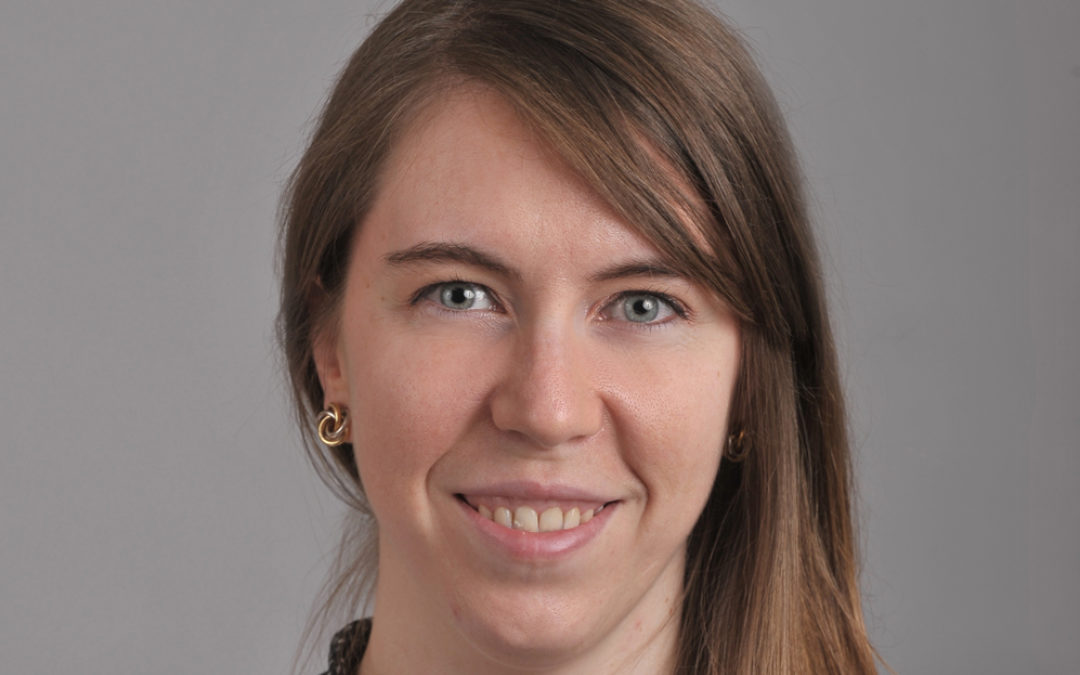Sometimes, the best recommendation for an ulcerative colitis patient with a damaged colon is to surgically remove the organ entirely and create a new ‘pouch’ made of small intestine tissue. This pouch, called a J pouch because of the shape of the sutures used to create it, is connected to the rest of a patient’s digestive tract internally and functions like a ‘new rectum’. As a GIRF Scholar, 2021-2022, Kinga Skowron Olórtegui, MD, worked closely with the UChicago Medicine Digestive Diseases Center team to advance the science of treating colorectal surgery patients through her research and clinical practice, with a specific focus on helping pouch patients have better surgical outcomes.
Dr. Skowron Olórtegui and colleagues have observed that not all pouches are created equal. A common complication following pouch surgery is pouchitis, an infection of the pouch that can interfere with a patient’s quality of life after surgery and alter the effectiveness of the pouch long term. Dr. Skowron Olórtegui first helped construct a database to organize and classify twenty years of clinical data on J-pouch patients by endoscopic activity, disease severity, and other clinical variables. In February 2021, along with many of her colleagues at the UChicago Medicine Digestive Diseases Center, Dr. Skowron Olórtegui co-authored a paper stratifying pouchitis in Clinical Gastroenterology and Hepatology. Different risk factors, including the type of sutures used to create the pouch, BMI, patient’s sex, prior C. difficile infection, and prior use of anti-TNF medications, all predicted different types of pouchitis. This new classification system will allow for further studies on intervention and treatment for pouchitis; lead to better, more individualized care for the pouch patient; and help surgeons make better decisions about how pouches are constructed.
During her year as a GIIRF Scholar, Dr. Skowron Olórtegui also completed her Master of Science in Public Health Sciences for Clinical Professionals degree. She received IRB approval to launch a comprehensive database of colorectal surgical patients, in order to prospectively collect information to allow for review and improvement of outcomes in colon and rectal surgery. She is currently launching the database and will be able to use this to study colorectal surgical procedures at the University of Chicago in the coming years. Over the course of this year, she mentored the colorectal surgical fellow, Gustavo Rubio, MD. They studied various colorectal surgical issues using a retrospective database. Their findings regarding the use of preoperative chemoradiation for patients with T2 rectal cancer (a stage of cancer not currently recommended for that therapy) were presented as an Abstract of Distinction at the Annual Scientific Meeting of the American Society of Colon and Rectal Surgeons, and the publication was accepted to the Journal of Gastrointestinal Surgery. They also studied the safety of diverting ostomy for patients with sacral decubitus ulcers (or pressures sores), and found that patients with malnutrition are much more likely to have complications with this procedure. This research will also be published later this year.
She recently married her partner Christian Fernandez Olórtegui, MD, a radiation oncologist. They are expecting a baby this winter.
Dr. Skowron Olórtegui is optimistic for the future of pouch patients, and grateful to the GI Research Foundation for supporting her ongoing work in this area.
“I am so thankful to the GI Research Foundation, and my mentors, for this opportunity. It is so inspiring to come together to improve patients’ lives through high quality research. We are truly at the forefront of colorectal surgery,” says Dr. Skowron Olórtegui.

